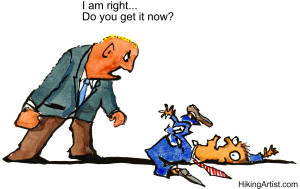This week’s Step Up Leader Tips explores the price we pay for incivility. You’ve probably noticed it more often, because it’s happening more often. I am aware of it when I attend performances at our local Performing Arts Center. People around me are talking aloud, unwrapping food, looking at their cellphones, etc. It’s frustrating to experience incivility when you are trying to relax and experience a special performance. Yet the impact at work is more than annoying. Incivility affects our workplace productivity, our emotional states, and even by extension, our health.
 Civility in America continues to erode and rude behavior is becoming our “new normal,” according to the fourth annual study on Civility in America: A Nationwide Survey, conducted by global public relations firm Weber Shandwick and public affairs firm Powell Tate in partnership with KRC Research.
Civility in America continues to erode and rude behavior is becoming our “new normal,” according to the fourth annual study on Civility in America: A Nationwide Survey, conducted by global public relations firm Weber Shandwick and public affairs firm Powell Tate in partnership with KRC Research.
This year’s study found that 70 percent of Americans believe incivility has reached crisis proportions. With Americans encountering incivility more than twice a day on average (2.4 times per day), and 43 percent expecting to experience incivility in the next 24 hours, dealing with incivility has become a way of life for many. Additionally, 81 percent of Americans think that incivility is leading to an increase in violence.
According to the Harvard Business Review, (Jan-Feb., 2013) in surveys of thousands of workers on the job, 98% have reported experiencing uncivil behavior. In 2011, half said they were treated rudely at least once a week-up from a quarter in 1998.
Incivility has a cost
Through a poll of 800 managers and employees in 17 industries:
- 48% intentionally decreased their work effort.
- 47% intentionally decreased the time spent at work.
- 38% intentionally decreased the quality of their work.
- 80% lost work time worrying about the incident.
- 63% lost work time avoiding the offender.
- 66% said that their performance declined.
- 78% said that their commitment to the organization declined.
- 12% said that they left their job because of the uncivil treatment.
- 25% admitted to taking their frustration out on customers.
Christine Porath, associate professor at Georgetown University’s McDonough School of Business in a recent New York Times article cited:
These are the rude behaviors by bosses most often cited in a recent survey, in descending order of frequency:
- Interrupts people
- Is judgmental of those who are different
- Pays little attention to or shows little interest in others’ opinions
- Takes the best and leaves the worst tasks for others
- Fails to pass along necessary information
- Neglects saying please or thank you
- Talks down to people
- Takes too much credit for things
- Swears
- Puts others down
These are the rude behaviors people most often admit to seeing in themselves.
- Hibernates into e-gadgets
- Uses jargon even when it excludes others
- Ignores invitations
- Is judgmental of those who are different
- Grabs easy tasks while leaving difficult ones for others
- Does not listen
- Emails/texts during meetings
- Pays little attention to others
- Takes others’ contributions for granted
- Belittles others nonverbally
- Neglects saying please or thank you
Source: A survey by the author of 605 people in 17 industries.
Being Civil is a Choice
Are people trying to be rude, or are they just oblivious to how they impact others?
I would invite you to check-in on civility in your work environment. Does your workplace value civility and acknowledge it? Does your organization act swiftly to disrupt incivility and deal with it on the spot? Is there training or coaching to educate and develop civility in those areas where it is most needed?
We all have a choice. Civility has a benefit beyond “good manners.” Our world and workplace requires our full attention to civility. It begins with each of us as individuals. We deserve nothing less.
I invite you to post your comments here. For information to support other effective leadership habits, click here to download my free audio, “5 Secrets Every Effective Leader Must Know.”

